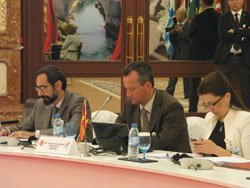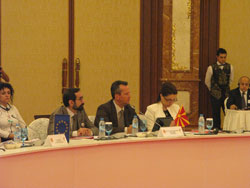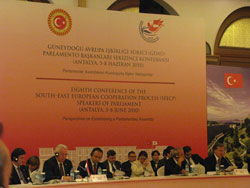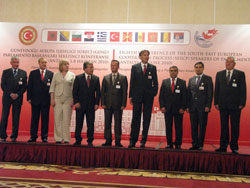Monday, 7 june 2010
Address by the President of the Assembly of the Republic of Macedonia Mr. Trajko Veljanoski at the 8th Conference of Speakers of Parliaments of the South-East European Cooperation Process (SEECP)
 Distinguished President
Distinguished President
Distinguished colleagues
Ladies and gentlemen
First of all I would like to express my gratitude to the Grand National Assembly of the Republic of Turkey and to the Turkish Grand National Assembly Speaker Mr. Mehmet Ali Sahin for the excellent organization of this meeting and for the hospitality we are feeling during our stay. This initiative - to dedicate this parliamentary meeting to the issue which is of common interest, promotion of the parliamentary dimension of cooperation in the framework if the South East European Co-operation Process (SEECP), makes me think that this Conference will be remembered as the beginning of a new stage of our regional cooperation.
After the one year discontinuity in the parliamentary cooperation on highest level in SEECP and the canceled conference in Kishnjev, with its engagement Turkey is doing something which can be referred to as a “bypass” We have had similar “bypass” before: between the Conferences in Athens in 1997 and Skopje in 2001, between Tirana in 2002 and Sarajevo in 2004, and so on. Nevertheless, after numerous bypass interventions, every organism, in this case the process of cooperation is in great danger. That is why today we are faced with an essential task - how to revitalize the parliamentary cooperation in the region.
Having in mind the experience of the exceptionally good regional cooperation of the parliaments in other parts of Europe, we often make the mistake in thinking that the regular parliamentary contacts on the highest level are not that much important. I would like to remind you of the recent Conference of Speakers of Parliaments of the EU Member States, which the Republic of Macedonia, the Republic of Turkey and the Republic of Croatia attended as candidate countries. At this Conference it was emphasized that the parliamentary cooperation is one of the pillars of the Lisbon Treaty - which means that it is the future of EU.
Ladies and gentlemen,
 The Republic of Macedonia as an independent and sovereign state has always paid great attention to the regional cooperation and to the good neighborly relations, in accordance with the international standards and principles. We do see these standards as an imposed additional obligation, but as a vital need for stabile and developed relations, with every neighboring nation and state. The multilateral regional cooperation is a general tendency in the development of the international relations, as part of the process of globalization. We were a little late in joining this process, but we have compensated this with the numerous new initiatives, processes and meetings. The parliamentary cooperation should have a strong contribution to the creation of a new climate in our mutual relations, supported by the general public, the business community and the civil society.
The Republic of Macedonia as an independent and sovereign state has always paid great attention to the regional cooperation and to the good neighborly relations, in accordance with the international standards and principles. We do see these standards as an imposed additional obligation, but as a vital need for stabile and developed relations, with every neighboring nation and state. The multilateral regional cooperation is a general tendency in the development of the international relations, as part of the process of globalization. We were a little late in joining this process, but we have compensated this with the numerous new initiatives, processes and meetings. The parliamentary cooperation should have a strong contribution to the creation of a new climate in our mutual relations, supported by the general public, the business community and the civil society.
I think that now is the time to put an end to the misunderstandings, prejudices, the intolerance and xenophobia from the past. In our regional cooperation we should be guided by the fact that “there are many more things that unite us that divide us”. These things should be the basis of the good relations between the different cultures, nations and religions. The successful completion of this complicated task has special importance for the countries in the Balkans and Europe in general. We believe that the Republic of Macedonia and every all the other countries in the region have capacity to accomplish this goal. This is the only way for the countries from the region to join our neighbors which are already members of EU in foreseeable future and be institutionally a part of the European family. We belong in Europe, both geographically and historically. The father of the European unity Robert Shuman in 1950 said that “Europe will not be built in a day not a part of some overall design; it will be built through practical achievements that first create a sense of common purpose”. Unfortunately, as a result of the lack of common purpose or solidarity Shuman spoke about and the absurd prejudice towards the Republic of Macedonia today we have the irrational name issue, which is the reason why the Republic of Macedonia is not a member of NATO and has not received the date for opening the negotiations with the EU despite the recommendation. Nevertheless, I would like to underline at this Conference that the Republic of Macedonia will not give up on its strategic commitment - the Euro-Atlantic Integration. Also, we do will not give up from the negotiations with our Southern neighbor in order to find a solution for the imposed dispute. At the same time I would like to point out that this solution should not affect the national, cultural or linguistic identity of the Macedonian nation.
Ladies and gentlemen,
Dear friends,
EU membership means carrying out many profound reforms. In the Republic of Macedonia this reform process and the harmonization with the Acquis Communautaire is not seen as something imposed by the Eurocrats from Brussels or by some foreign factor. On the contrary, for us it is a fundamental responsibility we have towards our citizens. The Assembly of the Republic of Macedonia as a representative of the citizens has an exceptional role in the implementation of the European principles, standards and values in everyday life. I would like to underline that we have made significant progress in many areas with the adoption and implementation of these European standards, and that we are prepared to share our experience with the other countries from the region.
 At the same time we are aware of the different position of the countries in this process, but this does not eliminate the possibilities for building successful bilateral and regional cooperation. In line with this we welcome the established forms of regional cooperation, especially the initiatives and specific projects in the field of energy, construction and modernization of the infrastructure for improvement of the connections between the countries and for economic and social development. Furthermore, the cooperation in the area of justice and human rights, security, fight against terrorism and organized crime, as well as protection of the environment is especially important. The role of the parliaments is to support, encourage and control these joint harmonized activities, and the parliamentary cooperation should be the umbrella of these activates.
At the same time we are aware of the different position of the countries in this process, but this does not eliminate the possibilities for building successful bilateral and regional cooperation. In line with this we welcome the established forms of regional cooperation, especially the initiatives and specific projects in the field of energy, construction and modernization of the infrastructure for improvement of the connections between the countries and for economic and social development. Furthermore, the cooperation in the area of justice and human rights, security, fight against terrorism and organized crime, as well as protection of the environment is especially important. The role of the parliaments is to support, encourage and control these joint harmonized activities, and the parliamentary cooperation should be the umbrella of these activates.
We are facing many serious challenges regarding different topical economic and social issues. The economic and financial crisis is something that affects all of us. And this is in line with the saying that the troubles of your neighbor are our troubles too. The EU started to develop a strategy for overcoming the crisis and for the future European development.
This is a long-term strategy which will enable development of a stabile market economy. If we respect the real interests of our citizens, the nations and SEE countries, we should contribute to the consolidation and structural reforms which should strengthen the European stability and secure the development of our region. It would be useful to exchange experiences about the successful solutions and the mistakes in the process of dealing with the economic crisis, which is a present challenge for all of us.
The support from the international community for our region is still necessary in every area – the economy, but also the security. Still, the impetus and the ideas for regional cooperation reflect our true interests and needs if they come from the region itself.
This organization of the 8th Conference of the SEECP Speakers of Parliaments is a new impetus for the Process of Cooperation in South-East Europe, and it is one of the points in the Draft-Final Declaration. This means further institutionalization which will lead to establishing a parliamentary assembly - that have been functioning in other regions in Europe for a longer period of time. This is not a new idea, it was present from the very beginnings of our cooperation and recognized as one of the points at our 1st Conference in Athens in 1997. This idea was and is acceptable in principle. The issue of transformation of the parliamentary cooperation requests continuity in the accomplishment of what has been previously agreed, and a pragmatic approach in the further development, respecting the step-by-step principle.
 Certain issues have been resolved: the Memorandum of Understanding and Inter-parliamentary Cooperation in SEE was ratified by the Speakers in Sofia in 2008; this document stipulates the mechanisms and forms of cooperation: regular annual conferences from item 3 following the principle of rotating presidency, which should be preserved. The SEECP Regional Secretariat for Parliamentary Cooperation, together with the network of the national coordinators and close cooperation with the Regional Cooperation Council in SEE have already been established. The question is how it can start functioning with full capacity and a defined status of the engaged representatives from the other parliaments, besides those from the host country?
Certain issues have been resolved: the Memorandum of Understanding and Inter-parliamentary Cooperation in SEE was ratified by the Speakers in Sofia in 2008; this document stipulates the mechanisms and forms of cooperation: regular annual conferences from item 3 following the principle of rotating presidency, which should be preserved. The SEECP Regional Secretariat for Parliamentary Cooperation, together with the network of the national coordinators and close cooperation with the Regional Cooperation Council in SEE have already been established. The question is how it can start functioning with full capacity and a defined status of the engaged representatives from the other parliaments, besides those from the host country?
These questions require application of proper national parliamentary procedures, especially if they contain financial implications. The Final Declaration rightfully underlines the need for establishing a Working Group in order to determine the modalities of the parliamentary dimension of the SEECP and to submit a report at the next 9th Conference of the SEECP Speakers of the Parliaments, and we fully support this.
I believe that we have the capacity, will, and certainly interest to realize all of this. That is why I am convinced that we are at the beginning of a period of successful realization of the process started here in Antalya.
Thank you.